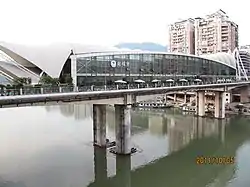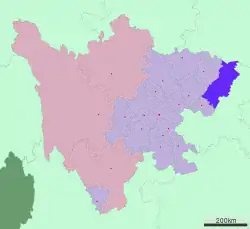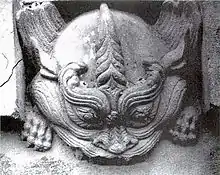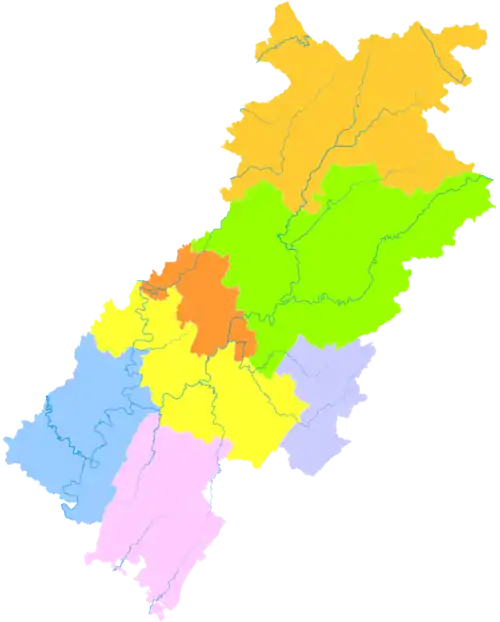Dazhou
Dazhou (simplified Chinese: 达州; traditional Chinese: 達州; pinyin: Dázhōu; Wade–Giles: Ta-chou) is a prefecture-level city in the northeast corner of Sichuan province, China, bordering Shaanxi to the north and Chongqing to the east and south.[1] As of 2010 census, Dazhou was home to 5,468,097 inhabitants whom 1,589,435 lived in the built-up (or metro) area made of 2 urban districts.
Dazhou
达州市 | |
|---|---|
 Covered bridge | |
 Location of Dazhou City jurisdiction in Sichuan | |
| Coordinates (Dazhou municipal government): 31°12′33″N 107°28′04″E | |
| Country | People's Republic of China |
| Province | Sichuan |
| Municipal seat | Tongchuan District |
| Area | |
| • Prefecture-level city | 16,591 km2 (6,406 sq mi) |
| • Urban | 3,137 km2 (1,211 sq mi) |
| • Metro | 3,137 km2 (1,211 sq mi) |
| Population (2010 census) | |
| • Prefecture-level city | 5,468,097 |
| • Density | 330/km2 (850/sq mi) |
| • Urban | 1,589,435 |
| • Urban density | 510/km2 (1,300/sq mi) |
| • Metro | 1,589,435 |
| • Metro density | 510/km2 (1,300/sq mi) |
| Time zone | UTC+8 (China Standard) |
| Postal code | 635000 |
| Area code(s) | 0818 |
| ISO 3166 code | CN-SC-17 |
| Licence Plate Prefixes | 川S |
| Administrative division code | 511700 |
| Website | www |
History

Dazhou's history goes back to the Eastern Han Dynasty when in 90 AD it was made a county by the name of Liweizhou (历为州). Then until the Liao Dynasty its name was Zaidi (在地). During the Liao and Tang dynasties its name was again changed, this time to Tongzhou (通州). Finally in the Song Dynasty it was given its present name of Dazhou.
Notable people from Dazhou include the Three Kingdoms writer Chen Shou, Song Dynasty astronomer Zhang Sixun, and Ming and Qing Dynasty philosopher and educator Tang Zhen. Dazhou also made notable contributions to the Communist Revolution. Red Army heroes such as Xu Xiangqian, Li Xiannian, Xu Shiyou, Wang Weizhou (王维舟), and Zhang Aiping were all from or lived in Dazhou.
The partially preserved mausoleum complex (in particular, its gate towers, known as que of the Shen (沈) family in Qu County, dating from the Han Dynasty, is a well-known architectural monument.[2]
Geography and climate
Dazhou is the easternmost prefecture-level division of the province, bordering Ankang and Hanzhong (both in Shaanxi) to the north, Chengkou County, Kai County, and Wanzhou District of Chongqing to the east, the Chongqing counties of Liangping and Dianjiang to the south, Guang'an to the southwest, Nanchong to the west, and Bazhong to the northwest. It is centrally located between Chongqing and Xi'an. The area is 16,600 square kilometres (6,400 sq mi).
The terrain is largely mountainous (Daba Mountains and adjacent ranges).
Typical of the Sichuan Basin, Dazhou has a monsoon-influenced humid subtropical climate (Köppen Cwa) and is largely mild and humid, with four distinct seasons. Winter is short, mild, and foggy, though actual precipitation is low. January averages 6.1 °C (43.0 °F) and, while frost may occur, snow is rare. Summers are long, hot and humid, with highs often exceeding 33 °C (91 °F). The monthly daily average in July, the warmest month, is 27.4 °C (81.3 °F). Rainfall is light in winter and can be heavy in summer, and over 70% of the annual total occurs from May to September. The annual frost-free period lasts around 300 days.
| Climate data for Dazhou (1981−2010) | |||||||||||||
|---|---|---|---|---|---|---|---|---|---|---|---|---|---|
| Month | Jan | Feb | Mar | Apr | May | Jun | Jul | Aug | Sep | Oct | Nov | Dec | Year |
| Record high °C (°F) | 20.1 (68.2) |
24.9 (76.8) |
32.1 (89.8) |
35.3 (95.5) |
37.5 (99.5) |
37.7 (99.9) |
40.6 (105.1) |
40.7 (105.3) |
39.7 (103.5) |
35.0 (95.0) |
27.0 (80.6) |
17.7 (63.9) |
40.7 (105.3) |
| Average high °C (°F) | 9.6 (49.3) |
12.2 (54.0) |
16.9 (62.4) |
22.5 (72.5) |
26.8 (80.2) |
29.4 (84.9) |
32.3 (90.1) |
32.7 (90.9) |
27.7 (81.9) |
21.5 (70.7) |
16.5 (61.7) |
10.6 (51.1) |
21.6 (70.8) |
| Daily mean °C (°F) | 6.3 (43.3) |
8.5 (47.3) |
12.3 (54.1) |
17.3 (63.1) |
21.7 (71.1) |
24.7 (76.5) |
27.4 (81.3) |
27.3 (81.1) |
23.0 (73.4) |
17.5 (63.5) |
12.7 (54.9) |
7.6 (45.7) |
17.2 (62.9) |
| Average low °C (°F) | 4.0 (39.2) |
5.7 (42.3) |
8.9 (48.0) |
13.6 (56.5) |
17.8 (64.0) |
21.2 (70.2) |
23.7 (74.7) |
23.4 (74.1) |
19.9 (67.8) |
15.0 (59.0) |
10.2 (50.4) |
5.5 (41.9) |
14.1 (57.3) |
| Record low °C (°F) | −2.2 (28.0) |
−1.5 (29.3) |
−0.1 (31.8) |
4.6 (40.3) |
9.7 (49.5) |
14.0 (57.2) |
17.0 (62.6) |
17.3 (63.1) |
12.8 (55.0) |
2.8 (37.0) |
1.3 (34.3) |
−4.5 (23.9) |
−4.5 (23.9) |
| Average precipitation mm (inches) | 15.5 (0.61) |
20.2 (0.80) |
44.9 (1.77) |
93.1 (3.67) |
163.6 (6.44) |
165.4 (6.51) |
223.1 (8.78) |
161.9 (6.37) |
144.3 (5.68) |
101.0 (3.98) |
48.9 (1.93) |
23.2 (0.91) |
1,205.1 (47.45) |
| Average precipitation days (≥ 0.1 mm) | 8.2 | 8.1 | 11.3 | 13.3 | 14.3 | 14.4 | 13.9 | 11.2 | 14.4 | 13.9 | 10.7 | 8.4 | 142.1 |
| Average relative humidity (%) | 82 | 78 | 75 | 76 | 76 | 80 | 79 | 76 | 80 | 85 | 84 | 84 | 80 |
| Source 1: China Meteorological Data Service Center[3] | |||||||||||||
| Source 2: Weather China (precipitation days 1971–2000) | |||||||||||||
Administration
It is one of Sichuan's most populous cities with 5,468,097 residents as of 2010 census.
| Map | |||||
|---|---|---|---|---|---|
| Name | Hanzi | Hanyu Pinyin | Population (2010 census) | Area (km2) | Density (/km2) |
| Tongchuan District | 通川区 | Tōngchuān Qū | 478,276 | 901 | 531 |
| Dachuan District | 达川区 | Dáchuān Qū | 1,111,159 | 2,236 | 497 |
| Wanyuan City | 万源市 | Wànyuán Shì | 407,594 | 4,045 | 101 |
| Xuanhan County | 宣汉县 | Xuānhàn Xiàn | 1,006,826 | 4,272 | 236 |
| Kaijiang County | 开江县 | Kāijiāng Xiàn | 430,877 | 1,030 | 418 |
| Dazhu County | 大竹县 | Dàzhú Xiàn | 876,884 | 2,077 | 422 |
| Qu County | 渠县 | Qú Xiàn | 1,156,481 | 2,019 | 573 |
Economy
Dazhou is an important river and land transportation hub for the region. Numerous national highways, expressways, and rail lines pass through Dazhou connecting it directly with major cities in China such as Chengdu, Xi'an, Wuhan, Guangzhou, Shenzhen, Beijing, etc., making it one of Sichuan's important trade centers.
Dazhou has numerous natural resources including large natural gas fields and an abundance of mineral resources such as salt, coal, manganese, lithium, and limestone. Major agricultural products include pork, beef, and tea. Other industries are chemical production, coal power, metallurgy, textiles, building materials, and processed food.
Tourism
Dazhou is blessed with both cultural and natural attractions. There are several national and provincial cultural sites and many national and provincial protected forests and nature reserves. Xuanhan's Baili Gorges have scenery and rapids, leading to the nickname "Little Three Gorges". Mountains are this area's greatest attraction.
Transportation
- China National Highway 210
- Xiangyu Railway (Xiangyang, Hubei−Chongqing)
- Dazhou–Chengdu railway
- A branch line from Dacheng to Wanzhou, Chongqing where it connects with the Yiwan Railway
- Dazhou Heshi Airport, which has frequent flights to Guangzhou, Beijing, Shanghai and other major cities domestically on daily basis
References
- http://data.un.org/Data.aspx?d=POP&f=tableCode%3A240
- Victor Segalen, "Chine. La grande statuaire", and "Les origines de la statuaire en Chine", p. 46 sq
- 中国地面气候标准值月值(1981-2010) (in Chinese). China Meteorological Data Service Center. Retrieved 20 October 2018.
